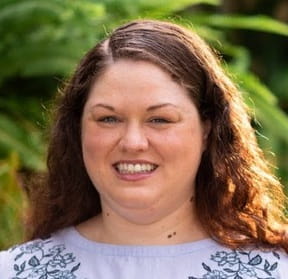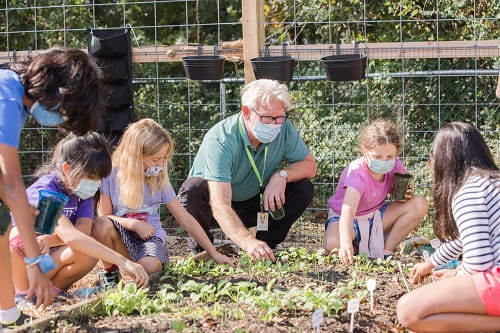Montessori philosophy emphasizes the importance of the relationship between humanity and nature, encouraging children to understand the symbiotic partnership that exists between themselves and the world around them. Dr. Maria Montessori once said, “Nature has this beautiful arrangement in which everybody, while striving for his own life and happiness, does something for the improvement and conservation of the environment.” From a very young age, children in Montessori schools are educated on ways in which they can positively impact the global environment through small daily tasks and large global projects. Heads of schools and Montessori guides introduce gardening, composting, and other practical life experiences to help students be involved with nature and give back to the world in which they live.
Princeton Montessori School, an independent, coeducational day school for children from infancy through middle school, that is fully accredited by the American Montessori Society (AMS), has truly embraced their environmental improvement and conservation efforts through the development of a unique plan that outlines their commitment to environmental sustainability. Michelle Morrison, head of Princeton Montessori School (PMonts), led the charge for faculty and students to develop an even stronger focus on sustainability efforts. By appointing Gery Juleff as sustainability manager and ecology teacher, Morrison advocated for the importance of a daily focus on the students’ relationship with nature. As Juleff says, “[Michelle] realized that, if the school was to live up to its principles and equip students to face the serious environmental challenges that they will encounter, it needed to do more to become more sustainable, set an example, and inspire and educate the students.” Thus, a beautiful partnership between Morrison and Juleff began at PMonts and their sustainability initiative was born.
Some of the sustainability projects Juleff has introduced or revamped at the school include the signing of a solar energy agreement, reinstallation of a Farm-to-School program in partnership with a local farm where students learn the process of growing their food, reinvigoration of an onsite vegetable garden, and initiating a sustainable composting system. In addition to these efforts, the school has invested in the installation of a solar array (group of solar panels) to be installed over spring break and fully functional by the end of the 2021 – 2022 school year. These panels will not only help to reduce energy costs for the school, but will serve as an inspiration to students as Princeton Montessori School does its part to fight against global climate change and contribute to the expansion of renewable energy. Over the 20 year timeline of PMont’s sustainability agreement, the array will help to reduce carbon dioxide emissions by about 3,000 metric tons and should save the school between $500 – $800K in electricity bills, and even more over the lifetime of the installation.
Although grand in scope and in potential global impact, these projects are just the beginning as Juleff continues working closely with his colleagues and community partners to develop Princeton Montessori School’s comprehensive sustainability plan for the future. Still in its development stages, Juleff expects that the future of PMont’s sustainability efforts will include a clear strategy with 5 year goals focusing on energy efficiency, the purchase and use of materials, biodiversity on campus, teaching sustainability in all grades and across curriculum areas, community service, the building of an equipped outdoor classroom, and the restoration of the wooded areas on campus in addition to current projects such as the Farm-to-School, composting, and gardening initiatives.
Juleff is excited to engage students on key environmental and sustainability topics as they undertake a number of projects such as adding environmental and sustainability webpages to the school’s website, developing lessons to teach climate change to younger students, creating a plan to increase biodiversity on campus, improving the school’s recycling efforts, and building a chicken coop as part of the school’s garden expansion. By participating in community service projects such as these, students will not only have the opportunity to learn basic skills about growing food, but will develop an awareness and appreciation of the value of forests, the danger of invasive species, and the fragility of our ecosystem. Perhaps most importantly, students at Princeton Montessori School will be doing their part to give back to the incredible world in which we live.
For those who might be interested in making similar sustainability commitments at their school, Juleff has written a “how to” guide based on his experience to help others in their quest for sustainability. His guide includes information on the installation of solar arrays and the benefits they provide.
Juleff advises, “This is very doable. It will save the school money, with minimal upfront costs and minimal staff involvement once an agreement is signed; and it is the right thing to do.” He recommends identifying a staff member who is enthusiastic about environmental sustainability with the drive to move the project forward and providing them time to dedicate approximately 10 hours per week over the course of 3 – 4 months to the initiative. Juleff is delighted to help inspire other schools and organizations as they embark on their sustainability journeys and encourages anyone interested in learning more to read his guide, but also do their own research and due diligence, bringing in expertise when needed.
As Dr. Montessori encouraged, each and every citizen of the world must do their part to improve and conserve resources in our global environment. Sustainability projects like those being implemented at Princeton Montessori School are highly impactful and inspirational ways of enhancing the richness and beauty of the world around us and protecting it for future generations.
References
Maria Montessori, Citizen of the World: Key Montessori Readings, (The Netherlands: Montessori-Pierson Publishing Company, 2019), 21.
About the Author
 |
Heather White, EdS, is a Montessori in-home teacher and nanny, a Montessori educational consultant for the Andrew’s Institute, a Montessori educator for adult learners, and a volunteer moderator for the Montessori at Home 0 – 3 Facebook page. Formerly, she was a Montessori teacher, Lower Elementary coordinator, and associate head of school. She also has experience as a School Psychologist intern. She is AMS credentialed (Early Childhood, Elementary I). Contact her at hpratt@stetson.edu. |
The opinions expressed in Montessori Life are those of the authors and do not necessarily represent the position of AMS.


